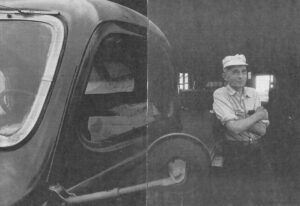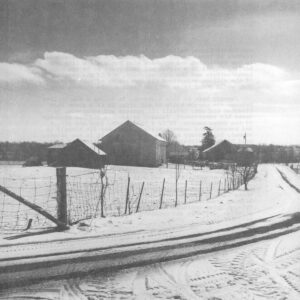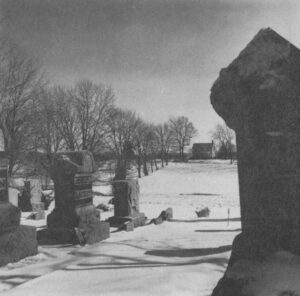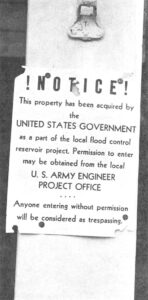John Baskin
- 1973

Fellowship Title:
- The Life and Death of a Small Ohio Village
Fellowship Year:
- 1973

New Burlington, Ohio: When a Town Dies
The Craftsmen: The Old Ways
The blacksmith shop is in the farmland north of the village. It was not the oldest blacksmith shop in the New Burlington farming community, but it survived to become the oldest. Hugh Lickliter built it behind his house in the first year of the great depression. One eye consulted the failure in the nation, the other regarded the rich New Burlington fields. If the shop faltered, he would make it into a double corncrib: nations rose and fell, and the fortunes of men, but the fields went on forever. In the spring, the plowshares piled halfway to the roof. Howard Pickering, fifth generation blacksmith, came to work and stayed forever. Hugh Lickliter is not a big man, but his crafty leanness implies the blacksmith’s strength that Howard Pickering states. Both give generous testimony to the mythologies of hard and frequent work, although younger men who worked as hard lie in the cemetery to the south. Howard Pickering, blacksmith and wheelwright Hugh Lickliter, blacksmith A month before Howard Pickering’s sixth birthday, he jumped from a haymow,

New Burlington, Ohio: When a Town Dies
The Narrowing Down – Part I & II
April 29, 1973 The Narrowing Down – Part I January comes to New Burlington as stealthy as old grief, known only by the idle spin of pages under Don Collett’s calendar portrait of Lovely Lillian, gazing insouciantly through the mad march of another year. Collett’s Hardware has moved now. Ronnie Grooms’ grocery store is gone. Wren Muterspaugh’s barber shop has been gone, and so has McClure’s Garage. Mrs. Louie Wills, at 94 the village’s oldest resident, has moved to the country, but it exists only in her mind’s eye. The preacher comes on Sundays still, to teach the natives shame, but there is less comfort now in such strained ritual. In January, the snows come to reclaim the village. January in New Burlington is a virtuous month, all flint and pious starch. Its arrival is known not so much by the calendar as by the way Vernie Brewer tells time in his fields — by the texture of time itself. It is something a man understands in New Burlington and no where else but a

New Burlington, Ohio: When a Town Dies
The High and Waiting Ground – Part I & II
March 30, 1973 The High And Waiting Ground – Part I Frank Robinson’s house is on one hill, the graveyard is on another, although half a mile away. To get to his work he walks, but everyone knows him and most of the time he is soon picked up. When a familiar automobile passes him by, as it occasionally does, he forgives, although the driver is likely to feel he has behaved irrationally, on some vague and quarrelsome instinct, and he is left with a tenuous cusp of a guilt as the gravedigger shrinks in the rear glass. One of the villagers, far into some solemn moment, will tell of this as if ashamed and say: “I’ve done that.” The gravedigger, living alone, returns silence for silence. The moment is too complicated, somehow past reckoning. Photo by Dan Patterson “There is something to a gravedigger being avoided,” he says. “There is something to that. I once had a good friend; he liked me and I him, but I buried his father and for six months

New Burlington, Ohio: When a Town Dies
February 28, 1973 Prologue All history, granted a wide enough perspective, is merely irony. In the paleozoic era, New Burlington, Ohio, was very largely limestone, at the bottom of the sea. Later, it was forest: the durable oak, the sweet maple, the sassafras, hornbeam and buckeye. Still later, in the last days of New Burlington itself, when the waters of Caesar’s Creek flooded into the village’s only cross streets one final time, farmer Phil Hartman drove his powerboat across the bottomlands towing his young son on water skis. The boy slalomed over Bill Conklin’s submerged fence posts and up into New Burlington, where he landed in 90-year-old Merle McIntire’s peony bed. Three generations down, five-year-old Gregg McIntire watched both the water and the Hartmans and suggested to Grandmother Merle that she not move from New Burlington as the Army Corps of Engineers demanded, rather remain and open a bait shop on her back porch which overlooked the Caesar’s Creek bottomlands. Gregg’s mother, thinking this like him, laughed. Merle McIntire did not. Unsuccessful at
